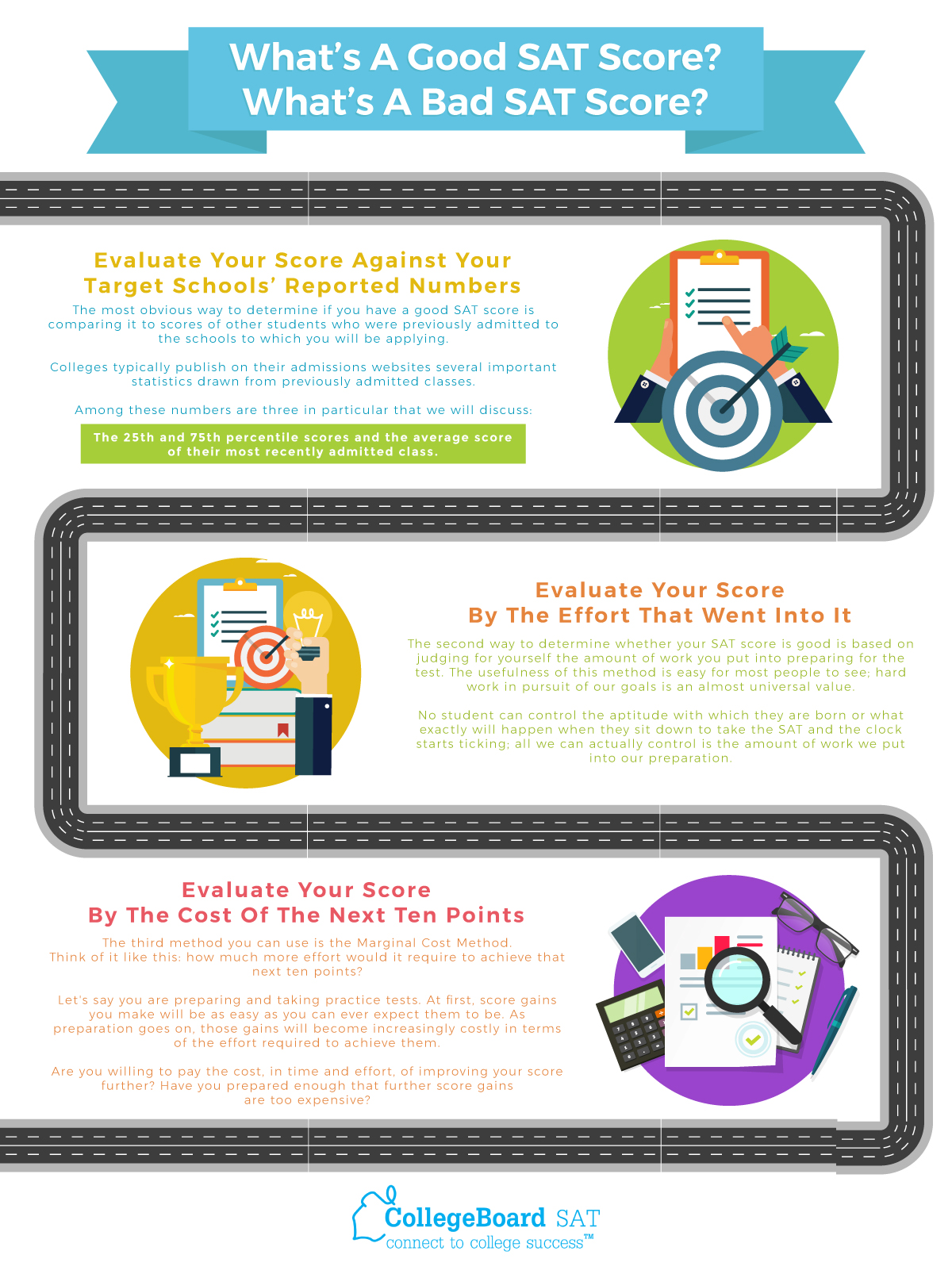What’s A Good SAT Score? What’s A Bad SAT Score?
At Prep Expert, one of the most common questions we get from students goes something like this: ‘I scored X on the SAT – is that good? Should I be satisfied, or should I take the test again?’ Or, the same question recast in negative terms: ‘is my score bad?’ In this post, I will explain how to answer these questions conclusively for yourself.
I will offer you three different ways to determine whether your SAT score is good, and tell you which I think is best.
[sat_one]
To get the best possible score you can, try our amazing SAT prep course.

Evaluate Your Score Against Your Target Schools’ Reported Numbers
The most obvious way to determine if you have a good SAT score is comparing it to scores of other students who were previously admitted to the schools to which you will be applying.
After all, for most students, the SAT is primarily a tool for getting into college. Colleges typically publish on their admissions websites several important statistics drawn from previously admitted classes.
Among these numbers are three in particular that we will discuss: the 25th and 75th percentile scores and the average score of their most recently admitted class. (Note: the average score is not exactly the same thing as the 50th percentile score, though the difference between these two numbers is, for our purposes, academic).
For example, let’s imagine you are applying to, say, Arizona State University, my alma mater. The average composite SAT score for ASU’s most recently admitted class was 1210 (on the new SAT, which is scored on a 1600-point scale). The 25th percentile score was 1090, and the 75th percentile score was 1330.
These numbers offer a concrete metric against which to compare your score, and can provide a fairly straightforward answer to the question of whether your score is good. Imagine you scored 1300: you could be confident that you have a decent chance of being admitted to ASU.
[leadmagnet_five]
Certainly, if the other areas of your application – GPA, extracurriculars, etc – are up to par, it is probably more likely than not that you will be admitted. If your SAT score were 1050, however, the situation is less favorable, because you are beneath the 25th percentile number mentioned above.
In other words, more than 75% of students in ASU’s previously admitted class did better on the SAT than you did. Similarly, if you scored 1350 on the SAT, you could be confident in your chance at admission, because you are above the 75th percentile mark for ASU, which means that you scored better on the SAT than at least three-quarters of ASU’s previously admitted class.
So, by comparing it to the average, 25th percentile, and 75th percentile numbers for the scores to which you will apply, you can get a comparatively straightforward and concrete idea of how good or how bad your SAT score is.
This comparison is typically the first one students make; if I only have thirty seconds to answer a student when they ask me if their score is good, this is the answer I will give. However, I think measuring one’s score this way is unhelpful in the big picture and often even counterproductive.
I will now detail two other ways of evaluating your SAT score, each of which I think is superior to this comparison with a school’s published numbers.

Evaluate Your Score By The Effort That Went Into It
Put the amount of work in that you want to receive.
The second way to determine whether your SAT score is good is based on judging for yourself the amount of work you put into preparing for the test. I think the usefulness of this method is easy for most people to see; hard work in pursuit of our goals is an almost universal value.
No student can control the aptitude with which they are born or what exactly will happen when they sit down to take the SAT and the clock starts ticking; all we can actually control is the amount of work we put into our preparation.
When a student asks me if their score is good, I typically respond by asking them what they did to prepare – and, tellingly, they never ask me why I want to know.
For instance, an unusually smart student might be able to achieve 1450 without much effort at all – he or she could probably show up on test day totally unprepared and beat the vast majority of his or her peers.
That score would give this student a very good shot at being admitted to most colleges. And yet I think most people, myself included, would have more respect for a student who worked tirelessly for weeks to break 1000.
Note that I am not suggesting that you must adopt my values regarding which score is more praiseworthy in this hypothetical situation – after all, I am a test-prep expert, not a moral authority.
I simply want to remind the reader of a very simple, meaningful, and trusted measure of success that often seems to get overlooked in the college admissions process: hard work and persistence.
Most of the students with whom I work (and, importantly, their parents) agree that the amount of focused work a student puts in to achieve their score is more important than how that score compares to any school’s published numbers – even if we all sometimes need to be reminded.
Some of our more results-oriented readers are undoubtedly rolling their eyes at this point, and I certainly understand. Evaluating a score purely based upon the amount of work that went into achieving it is great, but most of us have real-world goals – that is, specific colleges to which we would like to be admitted – that could come down to that next ten points.
If simply working hard for it is not enough for you to be satisfied with your score, read on. The third method I will offer for judging whether your SAT score is good is, in my opinion, the best answer available.

Evaluate Your Score By The Cost Of The Next Ten Points
Use the marginal cost method.
The third, and final, way of determining if you should be proud of your score is more complicated, but it is, I think, the definitive way to know when your SAT score is good enough.
And it applies universally – in all cases, to every student, everywhere. Moreover, it is value-agnostic; you don’t have to accept my platitudes about hard work being more important than results to see the utility of this method.
[sat_two]
I think of it as the marginal cost method, and it goes something like this: how much more effort would it require to achieve that next ten points? Before I explain exactly what I mean by this question, let me back up and explain a couple of assumptions that I will be making.
First, let us assume that every student who sets out to prepare for the SAT has a top-end score (or, more likely, a range of scores) that represent the best that student could ever realistically hope to do on the test. That score is probably different for each person.
If I chose one hundred SAT-takers at random and gave each of them a complete calendar year to study full-time for the exam, the scores they achieved after that year would be spread across the scale.
In each case, the score the student achieved would represent what I am calling their top-end score: the best they could ever realistically hope to do on the test. Another week of studying, after a year of it is unlikely to make that score come up much.
My second assumption is: virtually no student is capable of achieving their top-end score without some preparation for the test. In other words, preparation will improve every student’s score, regardless of their starting point.
If you are uncertain of this premise, take my word for it: I have seen a lot of test prep in my day, and no one is above benefitting from SAT prep – no matter how naturally gifted or hopelessly lost.
If you accept these two premises, then the question becomes theoretically quite simple. Every student should prepare for the test. When a student’s preparation begins, the score gains that he or she makes will tend to be comparatively easy: a little bit of hard work will go a long way.
For instance, the first time a 99th percentile instructor in a Prep Expert course explains to you how to exploit the inherent weaknesses of a multiple-choice math test, your score will probably come up sharply, with a minimum of costly effort and practice. In such a case, economics tells us that the student’s marginal cost of score improvement is quite low.
By contrast, recall the student who has studied full-time for a year. How costly are his or her score gains likely to be? Infinitely costly, or nearly so. In other words, that student could continue to study for another month and would likely improve his or her score little or not at all. That student’s marginal cost of score improvement is extremely high, and few people would continue to prepare in such a situation.
The third method of evaluating whether or not your score is good enough to satisfy you is based on this marginal cost of score improvement. Think of it this way: you should certainly prepare for the test. In the beginning, the score gains you make will be as easy as you can ever expect them to be.
As your preparation goes on, these score gains will become increasingly costly in terms of the effort required to achieve them. For the vast majority of test-takers, no amount of work could ever enable us to earn a perfect score.
The wise student will be aware of and expect this increasing difficulty before his or her prep begins. Such a student will know that he or she should be satisfied only when the marginal cost of score improvement becomes more than that student is willing to pay.
In practical terms, that student will only be satisfied with the score he or she achieves after he or she has prepared enough that further score gains are unrealistically expensive in terms of time and effort.
Thus, you could say that a student who scored 1450 without preparing for the test actually has a bad SAT score!
So, should you be satisfied with your SAT score? The marginal cost method of answering this question has this to say: your score could probably be better. Are you willing to pay the cost, in time and effort, of improving your score further?
Or have you prepared enough that further score gains are too expensive? That is the point you want to reach; any score you achieve before you reach that point is, quite simply, not good enough – by your own standards.
Thanks for following these explanations. I hope you find them useful (if a bit long-winded). If you’re seeking further information about what we offer, check out Prep Expert.
In future posts, I will continue to discuss score improvements, expectations for your own test-prep, and the admissions process in general, among a host of other topics. Until then, study hard!
[sat_three]
For more test strategy, college admissions, and scholarship application tips sign up for our FREE class happening right now!
Good SAT Score FAQ
How can I figure out if I have a good or bad SAT score?
The first way to determine if you have a good SAT score is comparing it to scores from other students who were previously admitted to your dream schools.
What scores do college look at when deciding who to admit?
Colleges typically publish on their admissions websites several important statistics drawn from previously admitted classes. The numbers you should look at when evaluating your score are the 25th and 75th percentile scores, and the average score of their most recently admitted class.
What’s another way I can figure out if I have a good SAT score or not?
The second way to determine whether your SAT score is good is based on judging for yourself the amount of work you put into preparing for the test.
Should I be satisfied with my SAT score?
The marginal cost method of answering this question has this to say – your score could probably be better. Are you willing to pay the cost, in time and effort, of improving your score further?
Written by Todd Marcus
More from Todd Marcus

The Best Foods To Eat Before A Test
Diet is important when it comes to learning. Besides knowledge, you do need actual “brain food” to keep the mind…

ACT Reading Passage Types | What To Expect
Be ready for the ACT Reading section by knowing the kinds of things you'll be reading. Here are the ACT…

Taking The ACT Junior Year
If you're ambitious and want to give yourself plenty of time for score improvement, then consider taking the ACT junior…